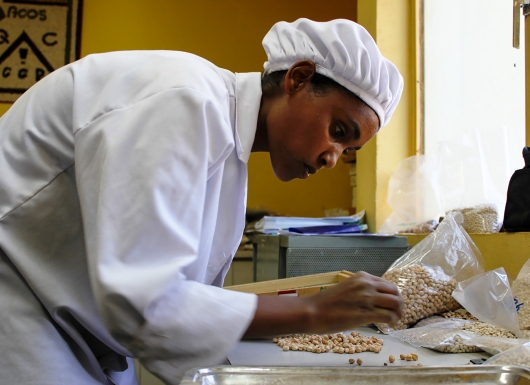Submitter: (ICRISAT)
The high-yielding, extra-large chickpea Kabuli variety ICCV 92311 (KAK 2) offers farmers an opportunity to improve income, nutrition, resilience, and livelihoods.

KAK 2 addresses a long-standing demand for varieties suited to both domestic and export markets that prefer bigger, cream-colored seeds. The larger seed size of KAK 2 fetches premium prices, often double that of traditional desi chickpeas, giving farmers a strong economic incentive to adopt the variety.
KAK 2 is especially popular and widely adopted in Andhra Pradesh, where it has contributed to a significant increase in chickpea area, production, and productivity. The variety thrives in the state’s post-rainy (rabi) season, making use of residual soil moisture after rice or other crops. It performs well in the central zone, including Madhya Pradesh, Chhattisgarh, Maharashtra, and Gujarat states of India. It can also work well in neighboring Soth and Southeast Asian countries like Nepal, Bangladesh and Myanmar. This extra-large seeded variety may also do well in eastern and southern African countries like Kenya, Tanzania, Malawi, Sudan and Ethiopia.
The introduction of KAK 2 contributed to a dramatic shift in chickpea cultivation from northern India (cooler, long-season environments) to southern and central India (warmer, short-season environments), where chickpea area increased from about 3 million hectares to over 5 million hectares between 2000 and 2011. In Karnataka, the chickpea area expanded by over five times and yield increased by 70%, resulting in an almost ninefold increase in production. Similarly, Maharashtra saw chickpea production rise nearly tenfold due to both area expansion and improved productivity.
KAK 2’s early maturity and disease resistance allowed farmers to use post-rainy season moisture efficiently, reducing the risk of terminal drought and increasing cropping intensity. Economic analysis shows that KAK 2 provides high net returns and favorable benefit-cost ratios, making it an attractive option for smallholder farmers.
The success of KAK 2 has not only improved household incomes but also enhanced food security and soil health through increased legume cultivation and natural nitrogen fixation.